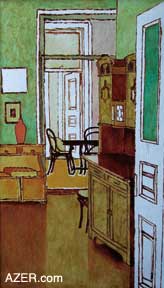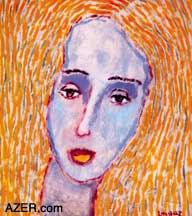|

Spring 2004 (12.1)
Pages
116-117
Sabir Ahmadli
"Love
of Heaven" (1996-1997)
To access
Sabir Ahmadli's works in Azeri (Latin), visit AZERI.org, Azerbaijan
International's Web site dedicated to Azerbaijani Literature
and Language. At present, Sabir has two complete novels: (1)
"Blood Transfusion Station" (Gankochurma Stansiyasi)
and (2) "Legacy of Life" (Omur Urasi). Also Sabir has
three short stories there: (1) "Voice from the Sea"
(Danizdan Galan Sada), (2) "Don't Turn Off the Light "(Ishighi
Sondurma), and "Black Flags" (Gara Bayraglar).
  Sabir Ahmadli was born in July 10, 1930,
in Jabrayil in southwest Azerbaijan, a region from which all
Azerbaijanis fled in 1993 and which has since been under military
occupation by Armenians. Sabir Ahmadli was born in July 10, 1930,
in Jabrayil in southwest Azerbaijan, a region from which all
Azerbaijanis fled in 1993 and which has since been under military
occupation by Armenians.
He graduated from the Department of Philology at the Azerbaijan
State University (now Baku State University) in 1951. Instead
of continuing his academic career, he returned to his native
region and began working, first, as a teacher, then as a director
of a school in Jabrayil for seven years. Later he returned to
Baku to join the editorial staff of Literature (Adabiyyat) newspaper.
Then he became the Editor of Literature and Art (Adabiyyat va
Injasanat). He was honored as People's Writer in 1992.
Sabir is the author of 16 novels and more than 50 short stories.
His most famous novels include: "Measure of the World"
(Dunyanin arshini); "Sign on the Slope" (Yamajda Nishana);
"Blood Transfusion Station" (Gankochurma Stansiyasi);
"Mass" (Kutla), which is dedicated to Azerbaijan's
national movement against the Soviet empire in 1988; "Forbidden
Game" (Gadaghan Olunmush Oyun) and "Legacy of Life"
(Omur Urasi).
His last book, "Love of Heaven" (Akhirat Sevdasi),
published in 2003, is based on the events surrounding the death
of his son Mahammad who died in 1993 fighting in the Karabakh
war.
An excerpt from "Love of
Heaven" follows. It was translated from Azeri by Aytan Aliyeva
and edited by Betty Blair.
· · ·
Art: Vugar Muradov. Visit AZgallery.org
for contacts.
  I see
him in the doorway of the room-tall, wearing his soldier uniform.
He's looking at me-light complexioned, beautiful blue eyes, and
thick, curly, black hair and eyebrows. He stretches his neck
a bit and stares at me through the doorway. What is he asking?
What is he saying? Is that him? I want to know this: IS THAT
HIM? I see
him in the doorway of the room-tall, wearing his soldier uniform.
He's looking at me-light complexioned, beautiful blue eyes, and
thick, curly, black hair and eyebrows. He stretches his neck
a bit and stares at me through the doorway. What is he asking?
What is he saying? Is that him? I want to know this: IS THAT
HIM?
IT IS HIM-there in the doorway, walking into the room. I sense
his presence in the air. Or is it just my memory and vivid imagination?
Is it only my memory? I'm so perplexed, trying to figure this
out. Is it really him or is it my memory that is fading day-by-day?
Could it be his soul? Or is it his appearance, simply born of
my dreams and my longings?
It's the most important question I've ever dealt with in my entire
life. Not just me, but all humanity, wants to know the answer.
We all seek confirmation: Do souls exist?
Teacher1
has finished checking the class register and is starting to look
through a pile of notebooks that she has brought home. But she
can't concentrate. It seems she's thinking about the same that
I am. Both of us sitting in this room-who are we? How are we
related to each other in the deepest sense of the word?
When you drop your glasses and they get broken, you feel bad
about it for several days. But what can you do when a healthy,
handsome boy disappears forever? The rooms are empty. His feet
will never climb those stairs again. He'll never appear again
alive at that door. Never mind that I saw him here 100 times,
just yesterday.
The old table, my bed with a canopy roof where he used to lay
down to rest from time to time, the kitchen where he used to
go all the time and where he would lift up the pot lids to see
what was there to eat.
Our neighborhood street, the entire world, was so vivid and dear
for us because he was alive. But he doesn't exist anymore. His
warmth has remained in the curtains of the three rooms of the
apartment where we've been living for the past 30 years. Day-by-day,
with his body disintegrating in the soil, traces of his existence
begin to disappear in our house as well.
His mother attends the mourning ceremonies. Many of our relatives
who were refugees have died. She goes and joins those who mourn.
She also weeps for our son and sings elegies. "My martyred
child!"
She looks at me and I look back at her. It's clear to both of
us: We remember him and cry bitterly. He has left us alone. He
left us without a daughter-in-law and without a grandchild. They
would have been the owners of this apartment. He would have carried
me on his tall, broad shoulders.2 He would have held me firmly with his
strong arms - the coffin of his dead father-me.
  Art: Vugar Muradov. Visit AZgallery.org for contacts. Art: Vugar Muradov. Visit AZgallery.org for contacts.
Sometimes, he used to wrestle, or do kickboxing, or karate tricks.
He would bang his fists against the wall.
"Mahammad, you'll break the wall down!" I would yell.
He would run and embrace me with his long arms.
"You've broken my ribs!" I would tease. He would laugh
and give me a big smile that stretched from ear to ear. He was
a beauty-everybody's favorite on our block.
He doesn't exist any more!
Then who is this person I see through the glass door? He's still
wearing his soldier's uniform but his cap is missing. His forehead
is opened from two places 3; his thick short hair had been cropped
short. Oh my God, I see him! It's him, it's him!
When I had left him at Pirkushgul, I had told him: "Ask
for permission in the evening and come home. If you don't come,
then we'll assume that they've taken you somewhere." He
didn't come that night. We were at a party at the home of Teacher's
sister. Her son had just become engaged. Their relatives-all
the nephews and cousins were at their place. They were all interested
in Mahammad.
A group of young guys were sitting, eating and drinking. None
of them had gone to the front. They had all evaded the draft
and somehow escaped the army. There was fighting going on in
the front. They should not have been sitting there at that moment.
We began to argue about the topic of "Gene Fund ".
They said that those who remained and had not gone to the front
and those who were studying made up the "Gene Funds"
of the nation, and those who were fighting - their genes weren't
really worth being kept.
When we say "Gene Fund", we mean the most valuable,
noblest members of the nation and humanity. Only those members
should remain, be taken care of and their progeny increased.
The nation should raise up the most honorable, patriotic people.
I reminded them that during these days, the only honorable people
were those who cared about the fate of their nation and they
were at the front, fighting in the trenches!
One of the brother-in-laws got angry and blamed those guys, gorging
themselves with food, because they had found "legal"
ways of not serving. He insisted: "The real Gene Fund is
comprised of those who are fighting against our enemies."
So, given that this dispute had taken place around the dinner
table, Teacher and I returned home that night very disappointed.
At two o'clock in the morning, the doorbell rang. His mother
woke up, looked through the peephole, and immediately opened
the door. It was him. He had already visibly lost some weight
and gotten homesick the first day. He said that they had sent
them to Goran.4
He had received permission to return to Baku with four of his
friends. They had ridden on the top of a tank all the way from
their military base to the railway station. It was snowing, absolutely
freezing. When they got off 20 km later, one of them had frostbitten
feet.
· ·
·
Mahammad's mother didn't want
to let him go. I also insisted: "In three days, it's your
birthday. Stay and celebrate at home, then go back."
But he wouldn't agree. He asked his mother to wake him up next
morning at six o'clock. He said that his friends would be waiting
for him at the railway station.
No matter how much we tried, we couldn't stop him. Before leaving,
he took something from the front pocket of his uniform and showed
it to his mother.
"What's that?"
"They gave us each a bed. I laid down to rest for a while.
Suddenly, I realized that something was poking me in the back.
I got up and looked. It was this-a shell from a machine gun."
"Get rid of it!" his Mother bristled.
"It's my destiny!" he said, putting the bullet back
into his shirt pocket-the pocket over his heart
End Notes:
1
The author often refers to his wife as "Teacher" in
his works, which is her profession.
2
Traditionally, sons carry their father's coffin on their shoulders.
3
The author is describing that his son was shot in the head by
a sniper's bullet.
4
Goran is a region in southwest Azerbaijan that was near the front
line. "Gor" in Azeri means "grave".
More Works:
Sabir's short story, "Voice
from the Sea" was published in the 1999 Literature issue
of Azerbaijan International. This story describes the tragic
events of "Black January" (January 20, 1990), which
resulted in the deaths of hundreds of civilians in the streets
in Baku when Soviet tanks attacked to put down Azerbaijan's independence
movement. See AI 7.1 (Spring 1999).
Back to Index AI 12.1 (Spring
2004)
AI Home
| Search | Magazine
Choice
| Topics
| AI Store | Contact us
Other Web sites
created by Azerbaijan International
AZgallery.org | AZERI.org | HAJIBEYOV.com
|



